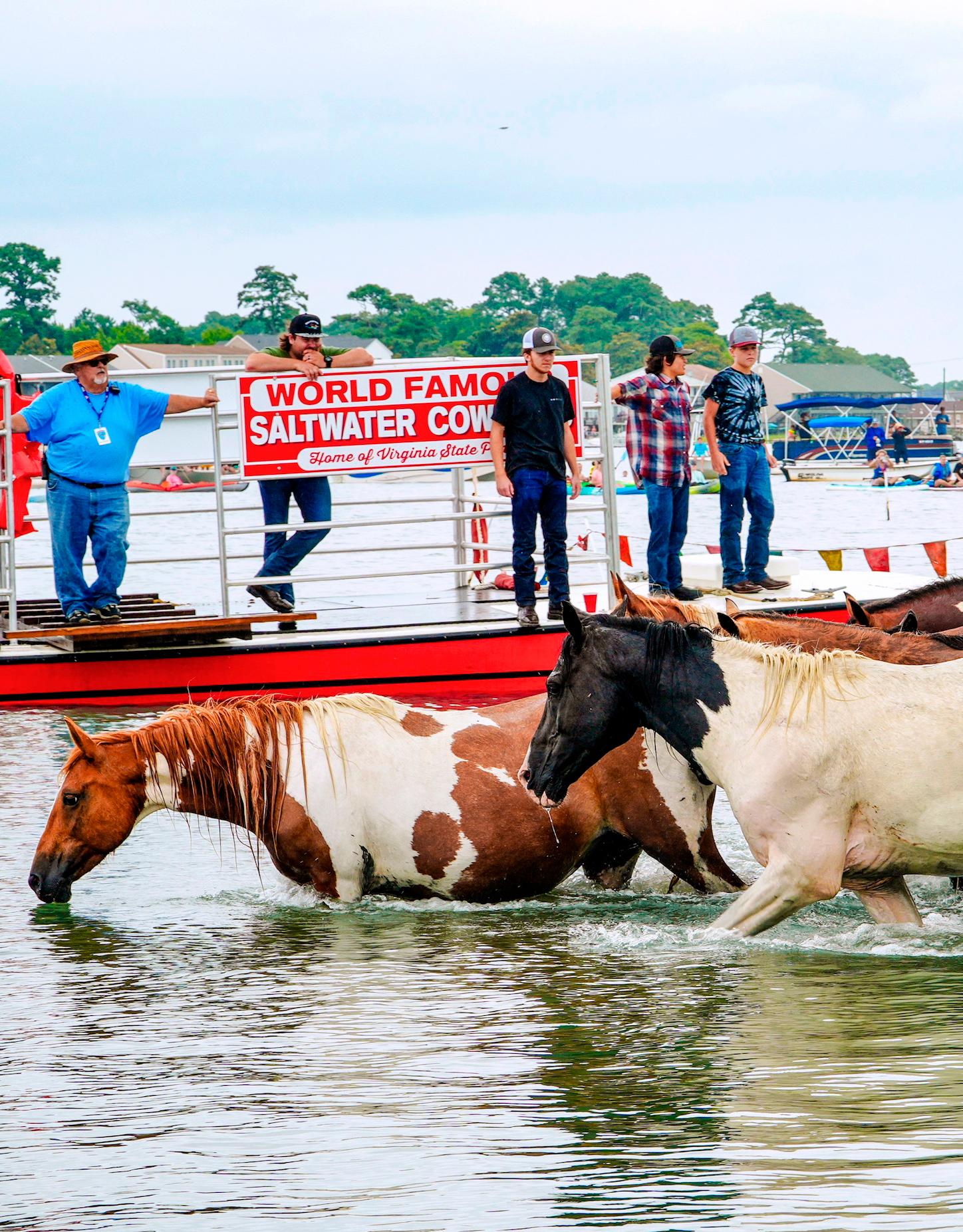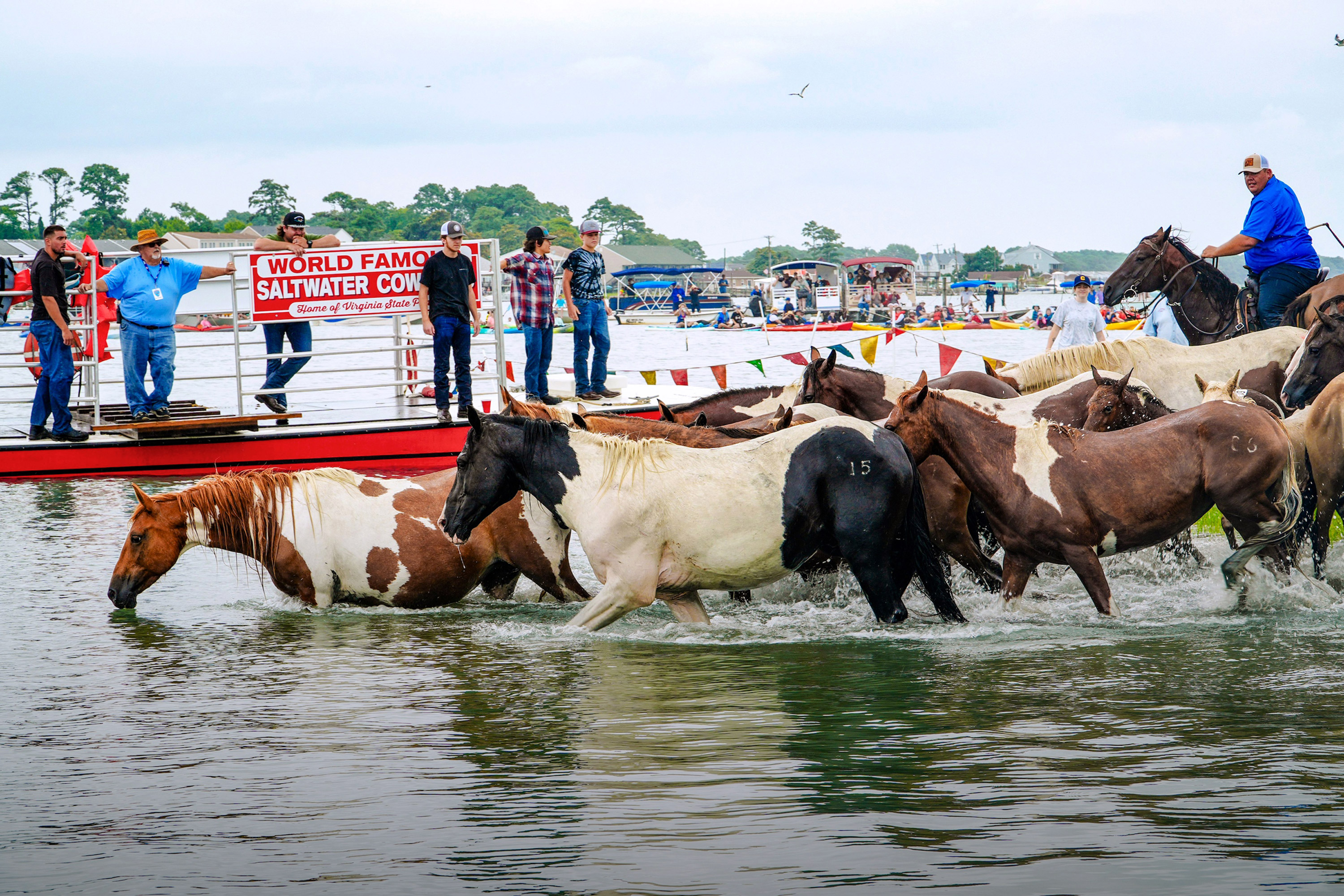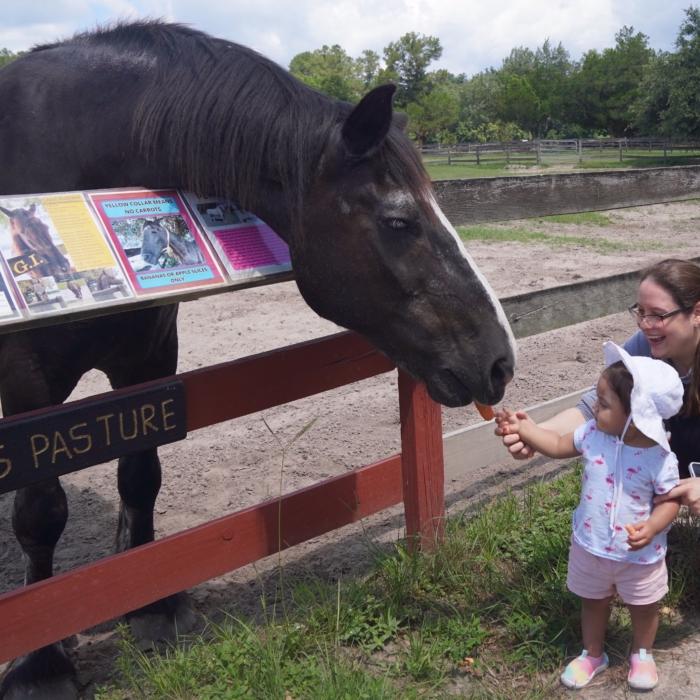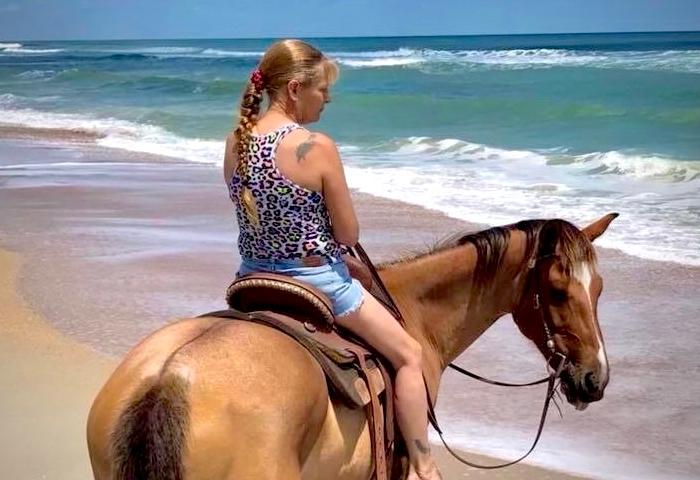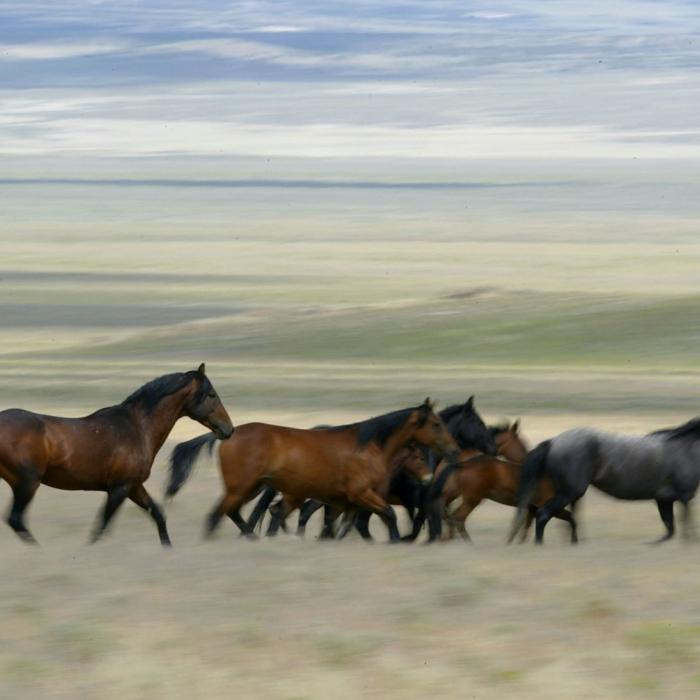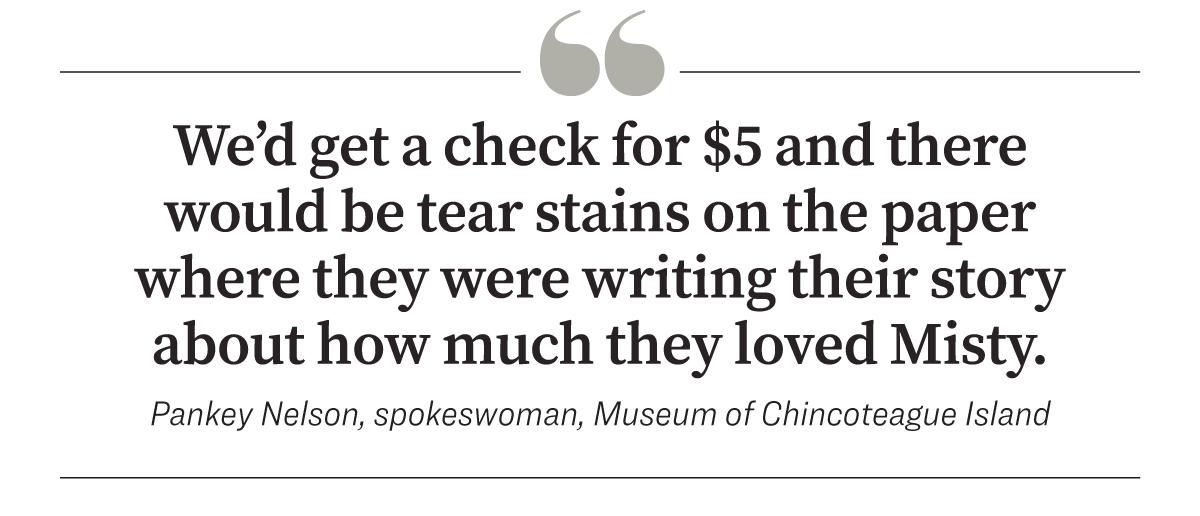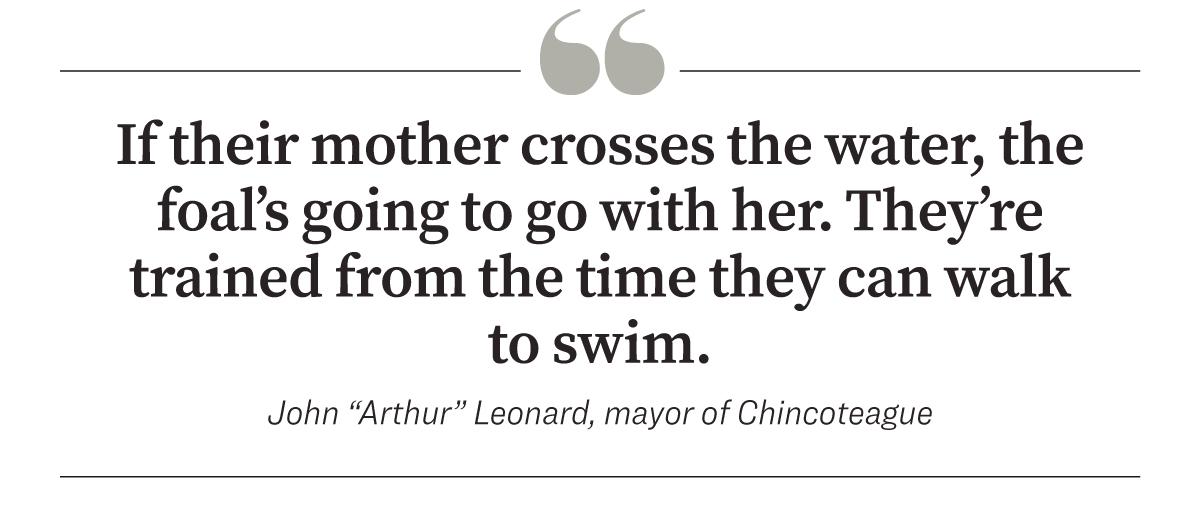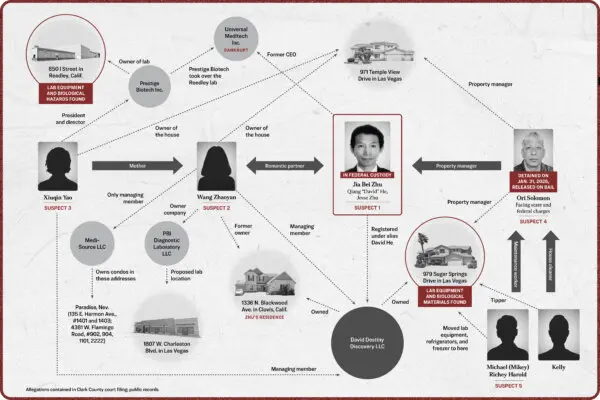CHINCOTEAGUE, Va.—Volunteers with nonprofits across America often bake sweet treats, wash cars, or throw big-ticket galas to raise money for their organizations.
But the Chincoteague Volunteer Fire Co. rounds up cash for operations in a way so heart-tugging that it attracts tens of thousands of spectators each year.
Their effort culminates in an auction of wild baby horses that raises enough money to pay for all of the fire training and equipment needed to protect the island community.
The foals that are sold come from a herd of wild ponies on nearby, unspoiled Assateague Island. The herd receives supportive care throughout the year from fire company volunteers.
Just witnessing the emotion-packed event—made famous by a book series and movie—is the fulfillment of a lifelong dream, many told The Epoch Times.
Fundraising With Horsepower
The tradition of selling ponies to acquire expensive firefighting equipment started back in 1924. An immediate success, it came to be known to locals as Pony Penning Week.“There were some really, really bad fires on Chincoteague, and there were two of them within like two years,” said Pankey Nelson, spokeswoman for the Museum of Chincoteague Island.
“First, one blew out half of the town. The other one blew out the other half of the town. And it didn’t take long to realize that the fire company needed more equipment and more training than they were getting.”
Selling ponies as pets provided the way.
Residents have skipped holding the event only twice—once during World War II and again at the beginning of the COVID-19 pandemic, Nelson said.
In 2025, the community will celebrate for the 100th time. The centennial is set for July 26 through Aug. 1.
The week-long spectacle, always held at the end of July, was made famous worldwide by author Marguerite Henry.
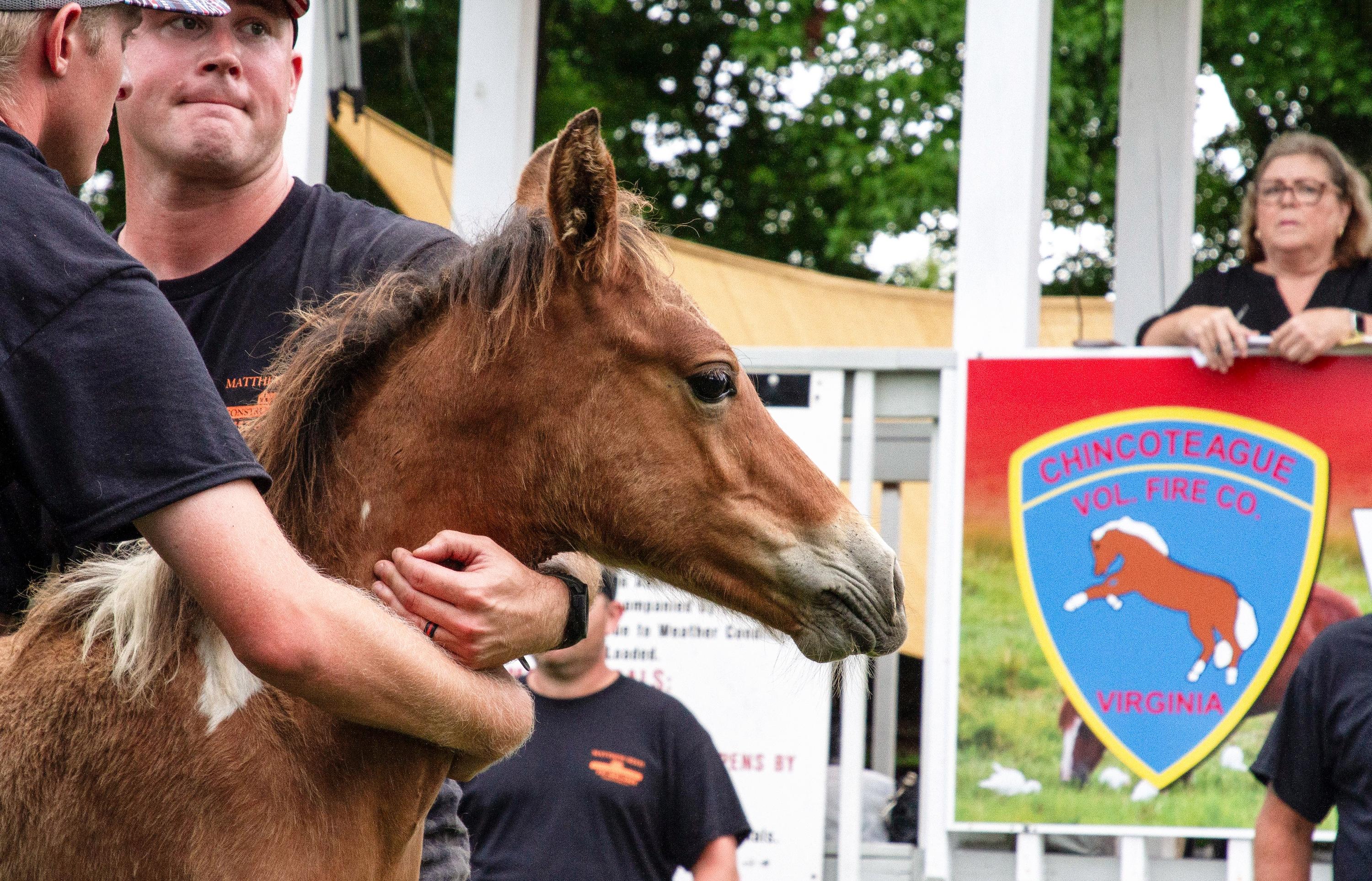
While on her fact-finding expedition, she was directed to a local horseman known as Grandpa Beebe, Nelson said. Charmed, Henry bought one of Beebe’s young Chincoteague ponies and named her Misty.
That pony and Beebe’s young grandchildren inspired Henry to pen the award-winning book “Misty of Chincoteague.” The first in a series, the 1947 tale sparked a worldwide fan base.
Fourteen years later, a movie based on the book was released. It was filmed on the island and featured just five paid actors, Nelson said.
Fans to the Rescue
In one of Henry’s books about the island, she described how residents were forced to evacuate ahead of an approaching storm. Before they left, the Beebes stowed pregnant Misty in a house with food and water and prayed she would be safe.
Three days later, as floodwaters receded, they returned to find the pony doing well, Nelson said. Shortly after, Misty gave birth to Stormy.
Henry told the story in 1963 in another hit, “Stormy, Misty’s Foal.” And to help the island community recover from the devastating flood, Henry hauled Misty and Stormy around the country, raising money for Chincoteague disaster relief, Nelson said.
Over the years, the 100-acre Beebe ranch was parceled off and given to family members, Nelson said, until only 10 acres remained, including the house where Misty was sheltered in the historic storm.
In 2023, a buyer surfaced, hoping to develop the last remnants of the ranch. Community members panicked. They felt it was too important to lose, Nelson said.
But, they wondered, how could they raise the $675,000 it would take to save the property from development?
“So we started raising money,” Nelson said. “We put the word out. People thought we were crazy—like, ‘You’re never gonna be able to do this’—but we said, ‘We have to try!’”
Within about a month, $100,000 had been raised. Donations poured in from all over the country and around the world.
“We’d get a check for $5, and there would be tear stains on the paper where they were writing their story about how much they loved Misty or how much they loved the island,” Nelson said. “Just so many touching, touching stories.”
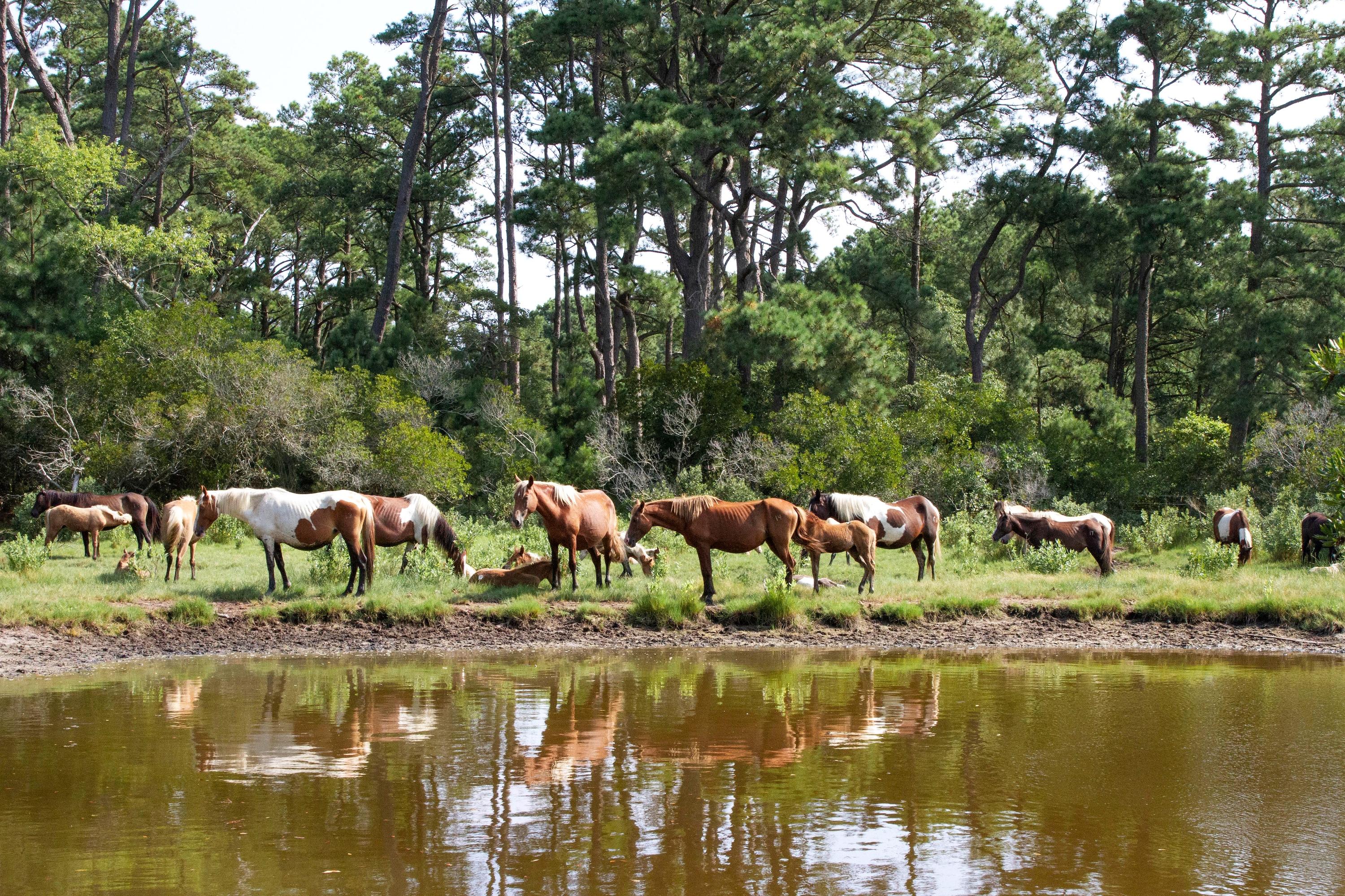
Children sent envelopes stuffed with coins they had saved by doing chores.
“I can’t tell you how many times things would randomly show up in the mail,” Nelson said.
Many packages held a heartfelt explanation: “I made this. Sell it [to raise money] for the Beebe ranch.”
Eventually, there was enough to strike a deal.
Hoofbeats in Island History
Wild ponies have lived on neighboring Assateague Island for about 400 years. They originally swam ashore from wrecked ships, Nelson said.Long ago, volunteer firefighters decided to manage the herd. They formed a band of “saltwater cowboys,” committed to caring for the wild ponies year-round. It’s a tradition that’s now passed from one generation to the next.
In 1943, the federal government preserved the marshes, dunes, and forested areas on Assateague as a national wildlife refuge. That was when an important agreement was forged.
Fire company volunteers could continue managing the herd of wild ponies, the contract with the federal government states. But they had to hold the herd size to no more than 150 adults.
The deal was orchestrated, town old-timers say, by a Washington lawmaker who wanted to be sure his descendants would always be able to see wild ponies there.
So the annual sale of babies continues to help keep the herd size in check.
Pony Penning Week Traditions
On the Monday of Pony Penning Week, thousands of locals and out-of-towners gather before sunrise along the beach on Assateague Island.There, as the sun peeps over the Atlantic Ocean, they watch cowboys bring in the herd during what’s known as the Beach Walk.
Surrounded by volunteers on horseback, stallions, mares, and foals amble along the water’s edge, then down a narrow marsh-lined road to a corral.
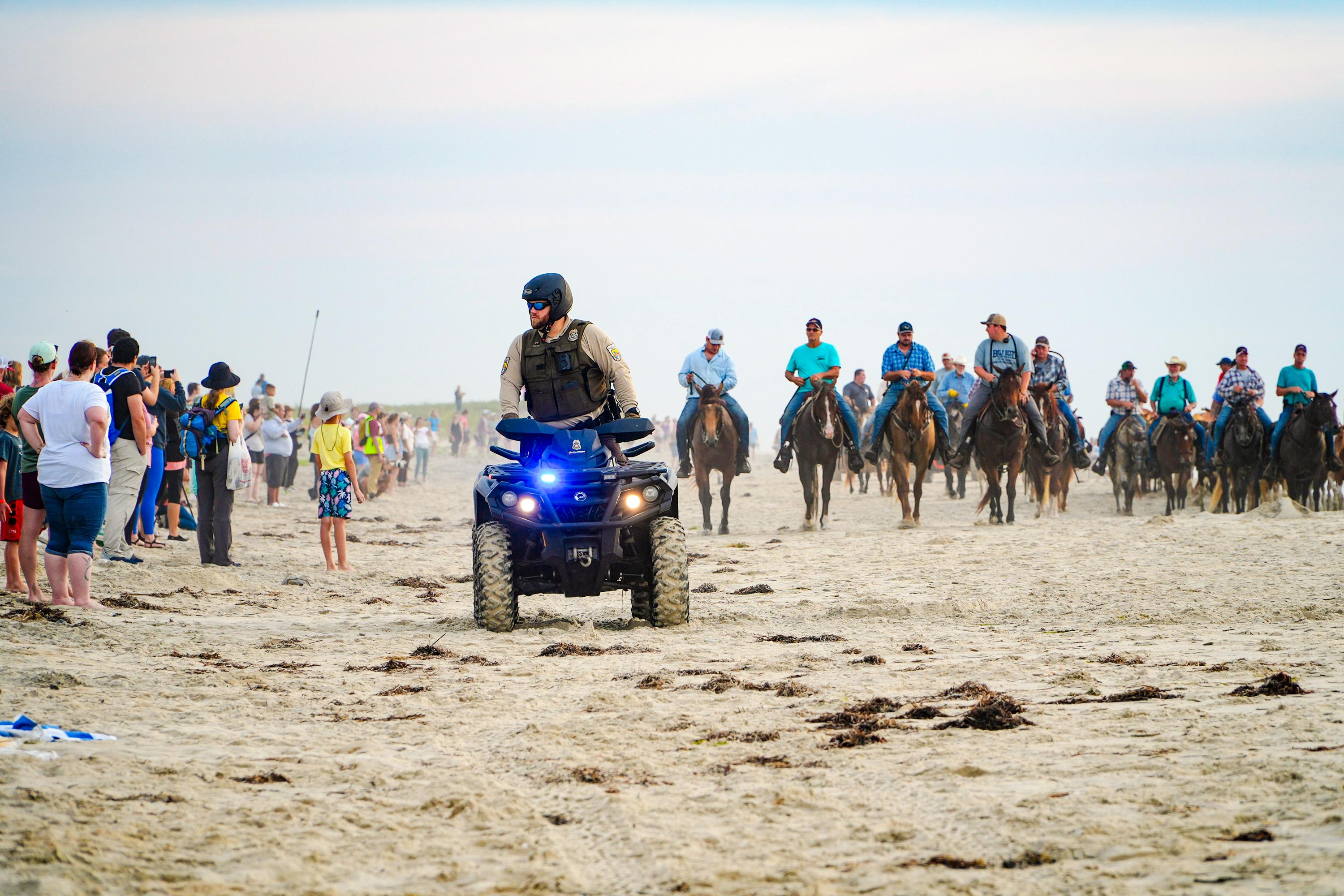
Joanne Rome of New Jersey has attended the event for 33 years.
“My mom is in her 80s, and she read ‘Misty of Chincoteague’ when she was younger,“ Rome said. ”And then in fifth grade, my teacher had us reading [the book].”
Eventually, she persuaded her mother to take her to see the ponies.
“We’ve been coming ever since,” she said.
Now, she owns a vacation home off Pony Swim Lane that allows her to watch the ponies cross the narrow channel from their wild home on Assateague to Chincoteague Island.
Since 1998, she has bought eight “buybacks”—ponies selected to remain in the herd based on genetics and good health, to keep the herd strong.
Nelson was part of two groups that bought ponies in 2023.
“So I own an eyelash or two,” she said with a chuckle.
Winning bidders have the honor of naming their buybacks before they’re released back into the wild forever.
The high-selling buyback in 2024 “sold” for $50,500.
Of Rome’s buybacks, a stallion named Chief and four mares still live on the island.
She was at the beach before dawn to try to catch a glimpse of them during the 2024 Beach Walk in July.
Mane Event
Leaning against the wooden corral within the Chincoteague National Wildlife Refuge, visitors from around the country swap stories about what brought them to the island.“It’s kind of like a reunion,” said Suzanne D’Ambrose, who visits from Neptune, New Jersey.
“We come to see the ponies; we actually know their names. And especially this time of year, everyone wants to see the foals.”
Like D’Ambrose, many visitors clutch guidebooks put together by local photographers. Armed with cameras and long lenses, the photographers hike miles each day on the lookout for newborn horses, hoping to help document their birth dates and identify their parents.
Bands of mares typically show loyalty to one stallion, so determining the father is always no more than an educated guess.
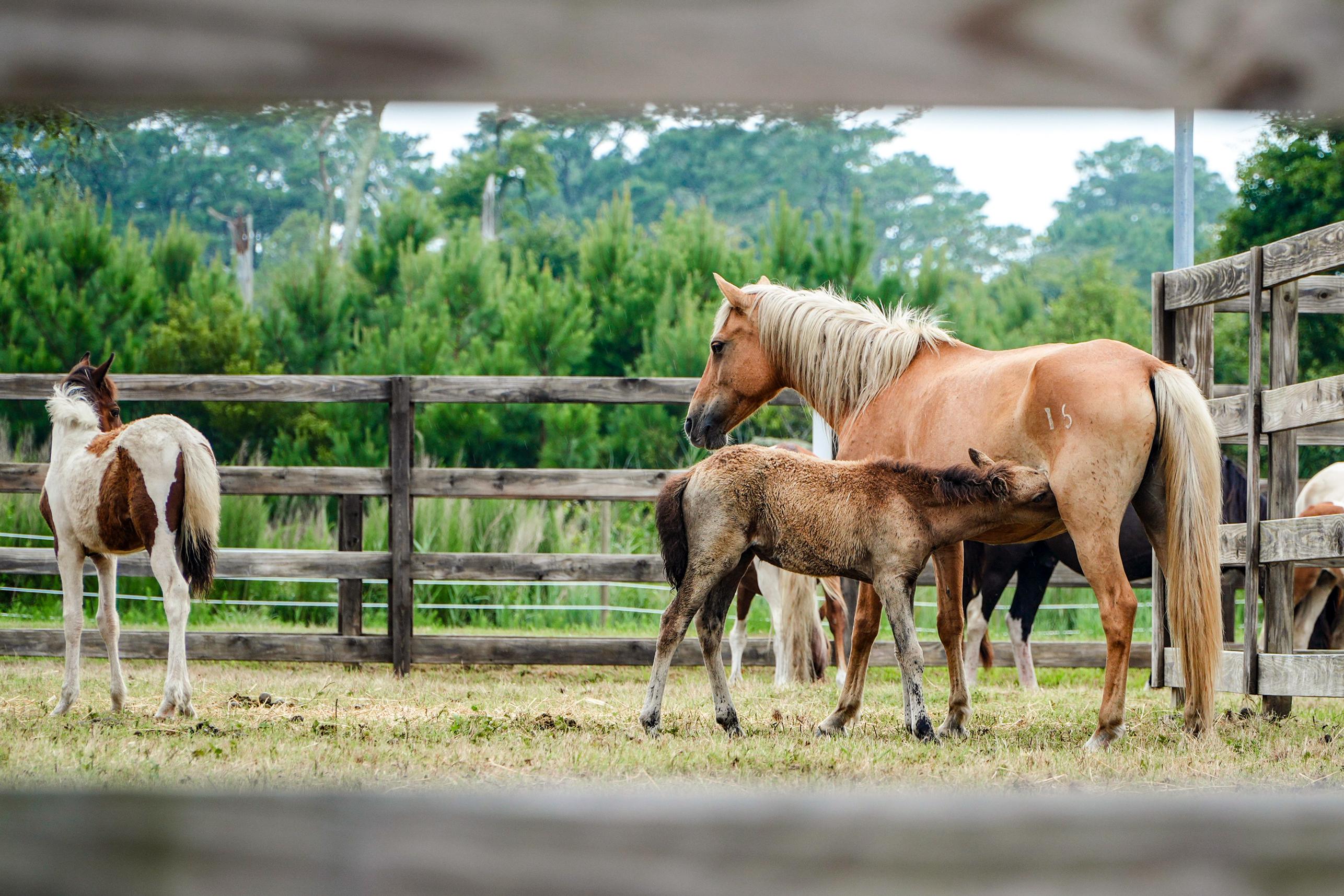
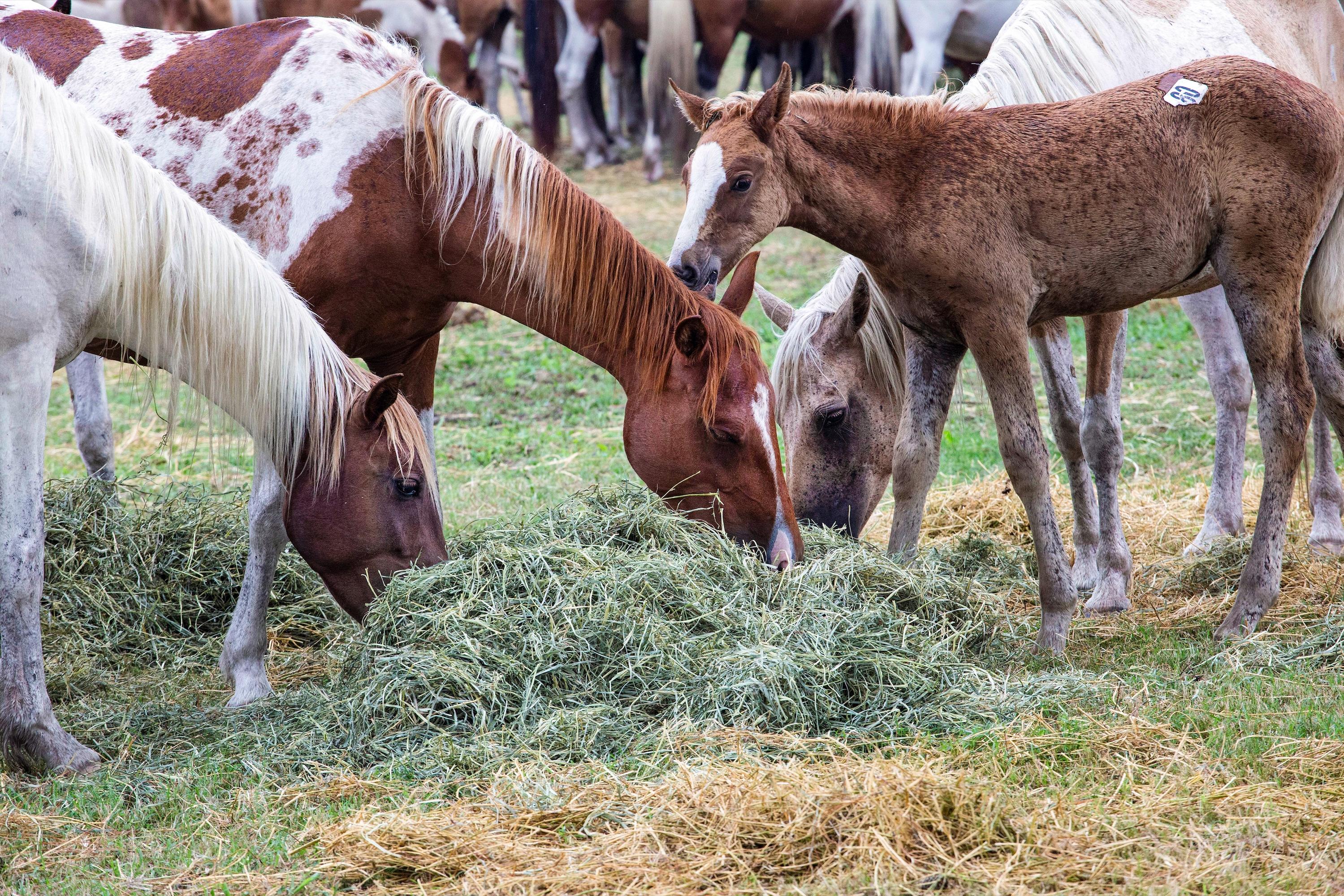
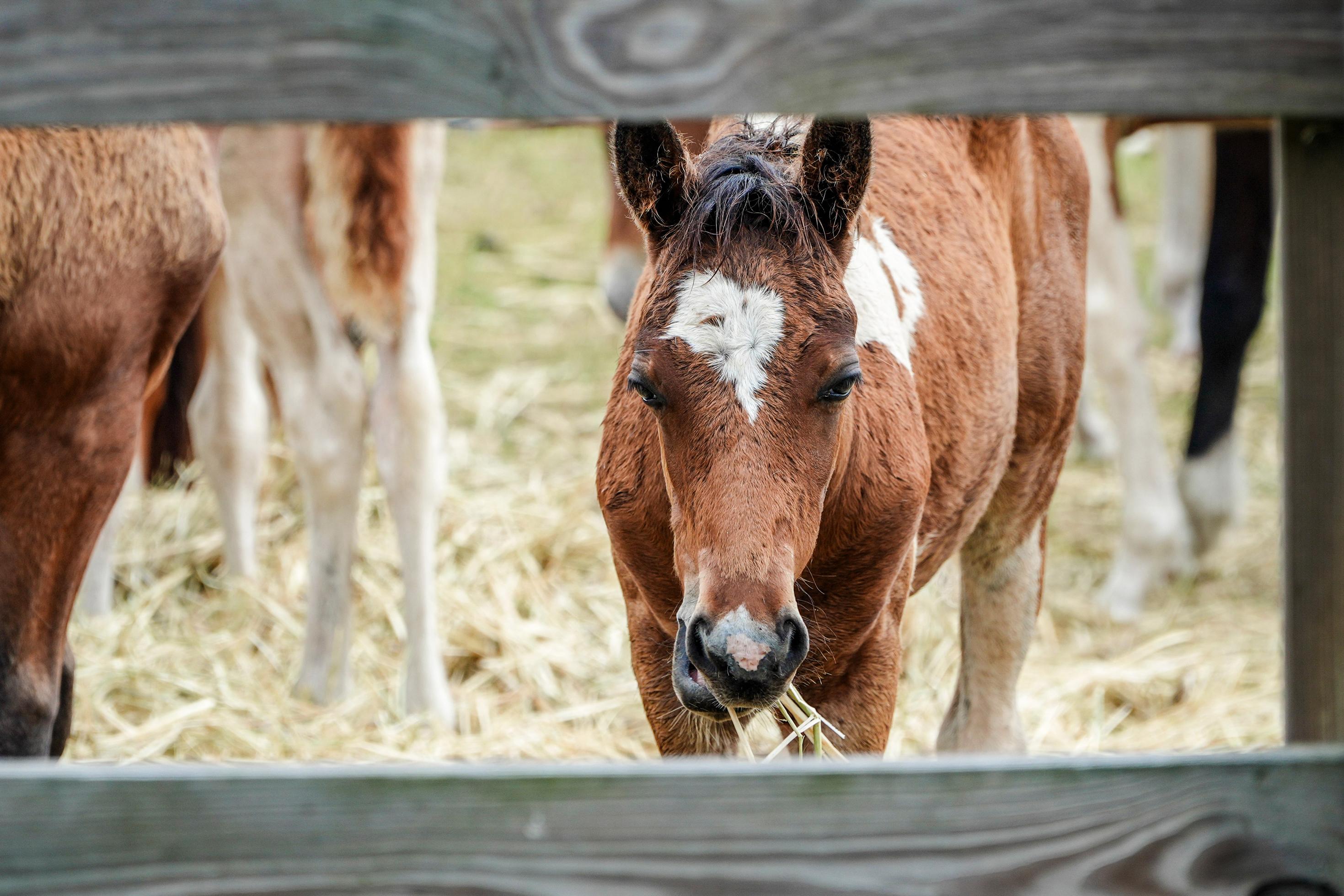
Through the board fence, pony fans watch foals nurse from the mares and nap in the sun.
They watch them bury their muzzles into piles of hay, snatching mouthfuls greedily.
They hear the warning snorts of the herd’s 15 stallions, who vigilantly keep watch over their bands. As leaders of their harems of mares and foals, they fend off interlopers with ears laid flat, clearly communicating to each other, “Stay back!”
The next day, always on the Tuesday of Pony Penning Week, veterinarians check the corralled ponies to determine which are too old, too young, or too pregnant to swim the channel to Chincoteague. “The Toos” as they’re called, are hauled in horse trailers to the community’s carnival grounds.
What comes on the Wednesday of Pony Penning Week is considered the “mane event”—the pony swim from Assateague to Chincoteague.
Thousands gather along the marshy strip on the Chincoteague side of the channel between the two islands.
In the narrow waterway, captains position their boats in a line perpendicular to the islands’ shores. Neighboring boaters lash their vessels together, forming a floating barrier and prime viewing spot.
On Assateague, cowboys move the herd from the corral to the water’s edge.
The timing is critical.
They aim for the ponies to enter the water at the first “slack tide.” It’s the safest time, when the moving water becomes unusually still as the tide reverses direction, Mayor John “Arthur” Leonard told The Epoch Times.
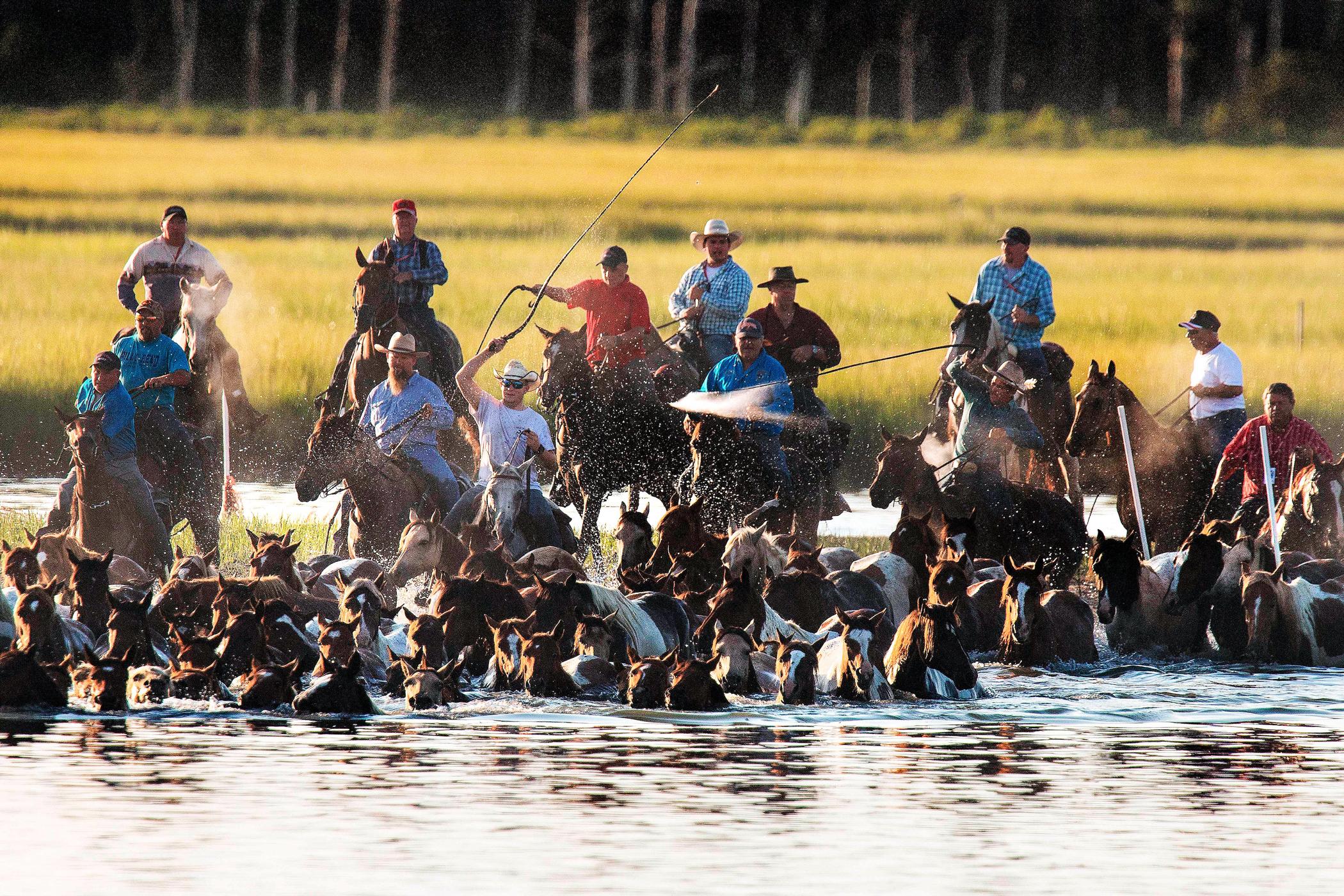
Controlling the Chaos
Leonard buys wild ponies and runs a breeding operation. He also operates boat charters to take people to see Assateague Island and help them spot the ponies year-round.He recalls just one real emergency during the annual pony swim.
It involved the stallion Surfer Dude—legendary for his beauty, with a dark, liver chestnut coat, blonde mane and tail, and blue eyes.
Surfer Dude was swimming on the outside of the larger group of the herd, eyeing his 20 mares and their foals, when he was pushed by the current into the anchor lines of boats.
As the entangled stallion struggled, Leonard leaped into the water and swam to the thrashing animal. Dodging powerful, flailing hooves, he cut the lines, freeing the pony.
Most years, though, the swim goes off without a hitch, he says.
On this day, his eyes take in all possible dangers. Are boaters staying where they should? Are cowboys moving the horses through the marsh to the shore on the Assateague side to be ready for slack tide? Are the crowds of spectators safely behind barriers where the swimming ponies will scramble ashore?
It’s part of his job to “control the chaos,” he says.
He reflects on how Chincoteague culture has changed from a seafaring economy to a town reliant on tourism. “When I was growing up, if you did something on the south end of the island, your parents knew before you got back to the north end of the island. The phones worked!”
Most of society has changed, he says. But this tradition remains largely unchanged.
Now, he anxiously begins to check the time, grimacing at markers in the channel that show the tides.
The cowboys are late.
But there’s a reason: The recent drought has changed the minerals in the grasses where the herd grazes. As a result, some of the pony mares have become deficient in calcium. The onset of hypocalcemia is sudden and can be fatal.
Several pony mares have fallen ill, Leonard learns in a call. And a cowboy’s horse has gotten bogged down in deep mud, requiring rescue.
But the saltwater cowboys are skilled at handling problems as they arise.
‘If They Can Walk, They Can Swim’
Leonard’s eyes scan the marsh on the Assateague side of the channel.Then suddenly, the herd appears—a glorious mass of mostly multicolored ponies, splashed with white, brown, black, and gold.
At his signal, two Coast Guard vessels blare their horns and cross paths in the middle of the channel, shooting orange-red smoke from flares into the air.
It is time.
As the mass of horseflesh moves toward the water, saltwater cowboys on horseback shout and crack bullwhips above their heads, encouraging the herd forward. Passengers on Leonard’s boat express concern.
The ponies swim every day during their life on the island, Leonard assures them. Foals follow their mamas into the water within hours after they’re born.
“If they can walk, they can swim,” he says. “It’s their nature. They’re with their mothers. If their mother crosses the water, the foal’s going to go with her. They’re trained from the time they can walk to swim.”
A few leaders wade into the water. More follow. In moments, all are swimming.
For about six tense minutes, the air crackles with drama.
Boaters moving alongside the ponies shout “Yah! Yah! Yah!” in an effort to keep the swimming horses moving in the right direction to the Chincoteague shore.
Spectators cheer, many standing knee-deep in mud, and thousands more watch on jumbo screens or from behind barriers at a waterside city park.
Ponies’ hooves churn under the surface. Their heads poke above the water. Foals whinny to their mothers.
The stallion Archer’s Gambit, known to locals as Puzzle, blasts to the front, as he often does during annual swims.
In about six minutes, he reaches the shore first, then regally turns to whinny encouragement to the others.
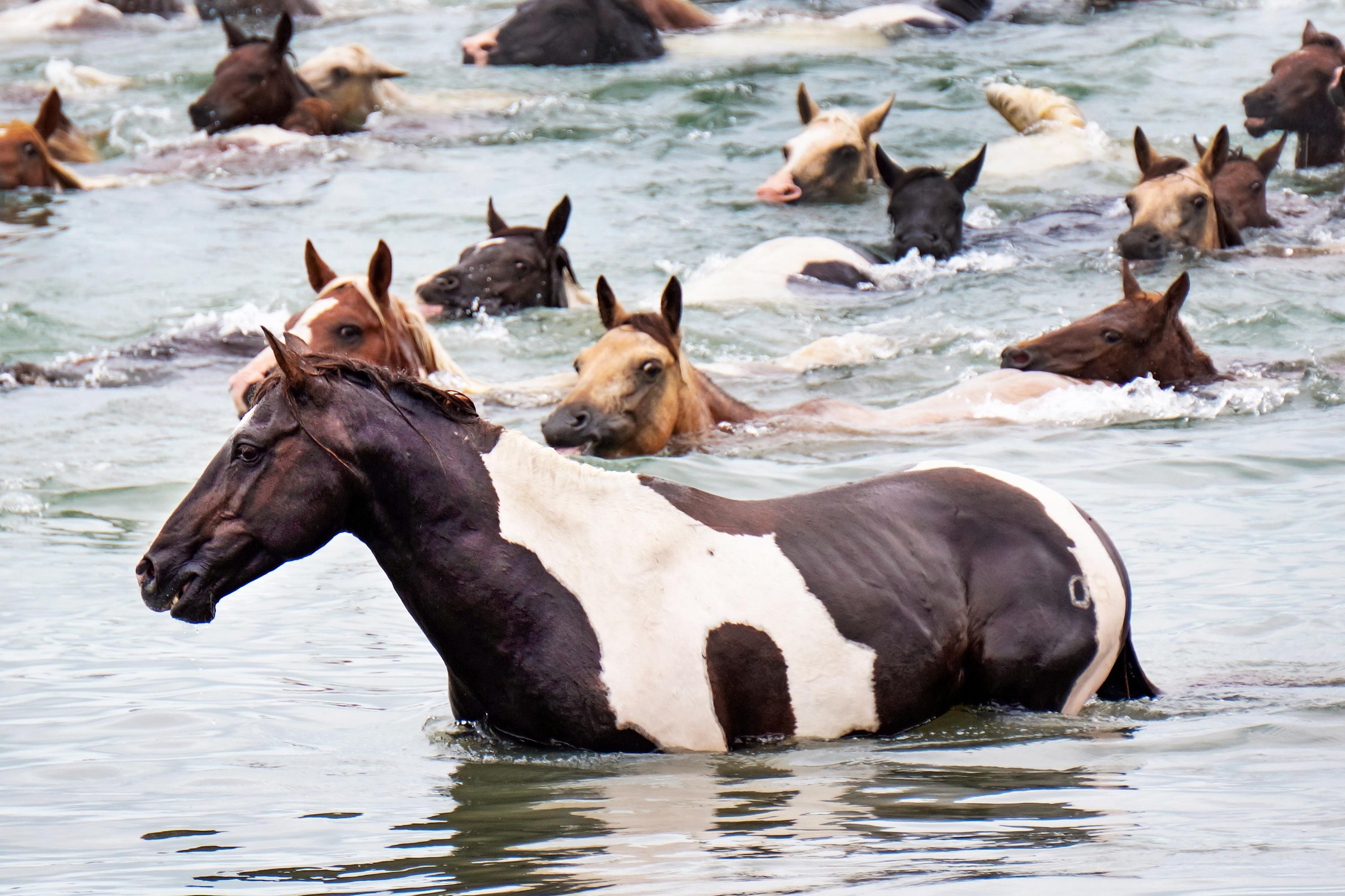
The first foal to reach the shore is crowned King Neptune or Queen Neptune. That baby horse will be the prize for the winning raffle ticket holder at the carnival that night.
The rest of the babies born in 2024 will be auctioned.
A Lifelong Dream
On Thursday of Pony Penning Week, people flood into the carnival grounds early to claim a spot near the auction arena.Strangers chatter about how just being there fulfills a lifelong wish.
And now, some confess, they hope to take home their own wild Chincoteague pony, the official state pony of Virginia.
At 8 a.m., the first baby pony is brought out, struggling against two handlers.
Bidding moves fast.
Adults, children, and online bidders from all over the country signal the price they’re willing to pay.
When the gavel falls, ringside winners often burst into happy tears, and the crowd cheers.
Bidders who don’t win often shed not-so-happy tears.
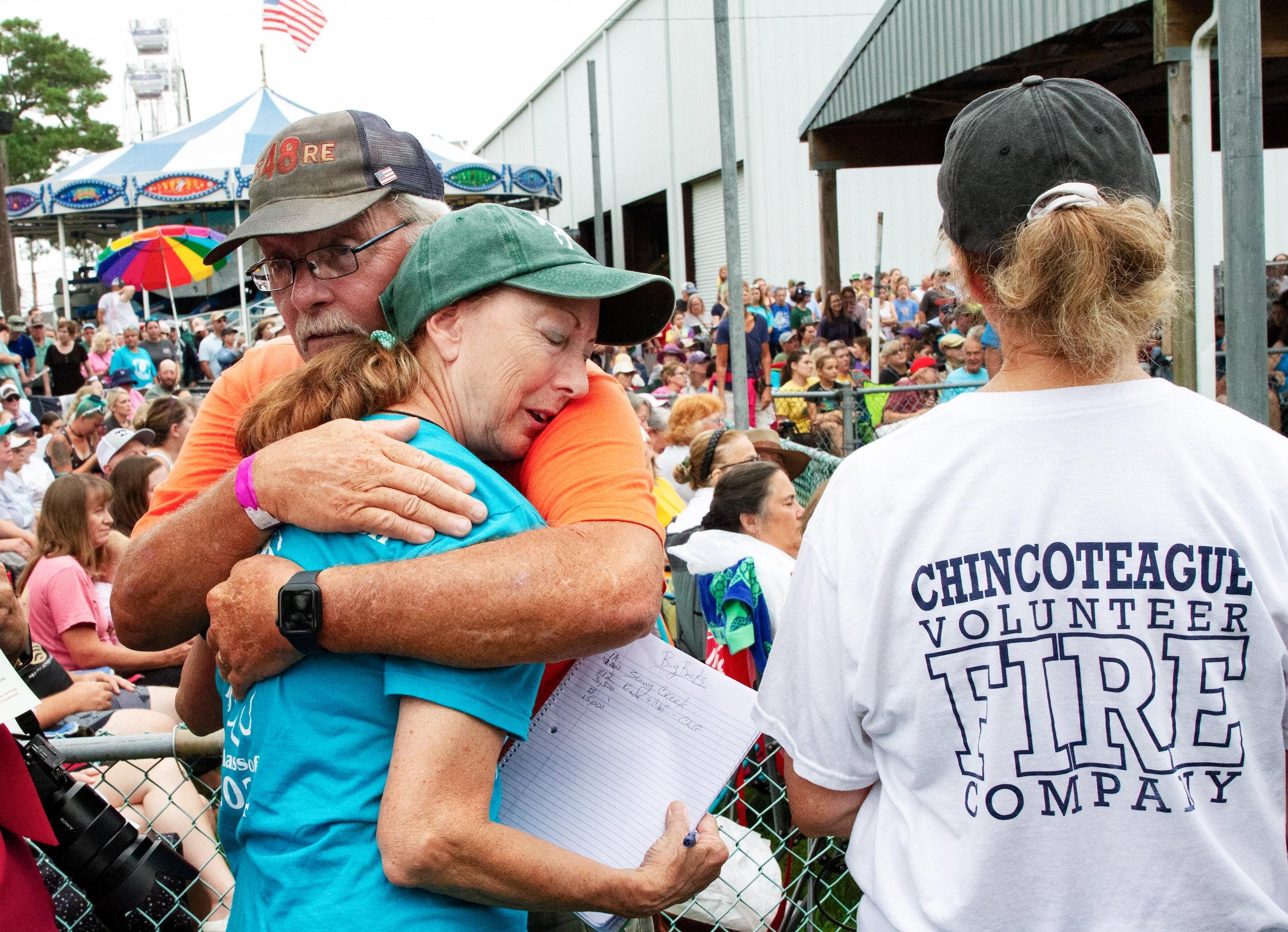
Representing a group, Loree Solé had tried desperately to secure the winning bid for a buyback pony to memorialize a friend, Sue Johnson. For many years, Johnson had operated the Blue Crab Treasures gift shop in Chincoteague. She died in 2021 after battling ALS.
Hundreds of friends have worked to raise money to buy a pony to return to the wild herd, named in Sue’s honor.
On auction day this year, the group’s budget of $15,000 fell just short at every attempt.
Hugs of consolation were shared. Tears of disappointment fell.
But by mid-September, Solé was focused on the mission again.
A Gift Horse
In hopes of taking home her own Chincoteague pony, budding equestrian Aurora Menges of Callicoon, New York, applied to The Feather Fund. That charitable organization carries on the work of Carollynn Suplee.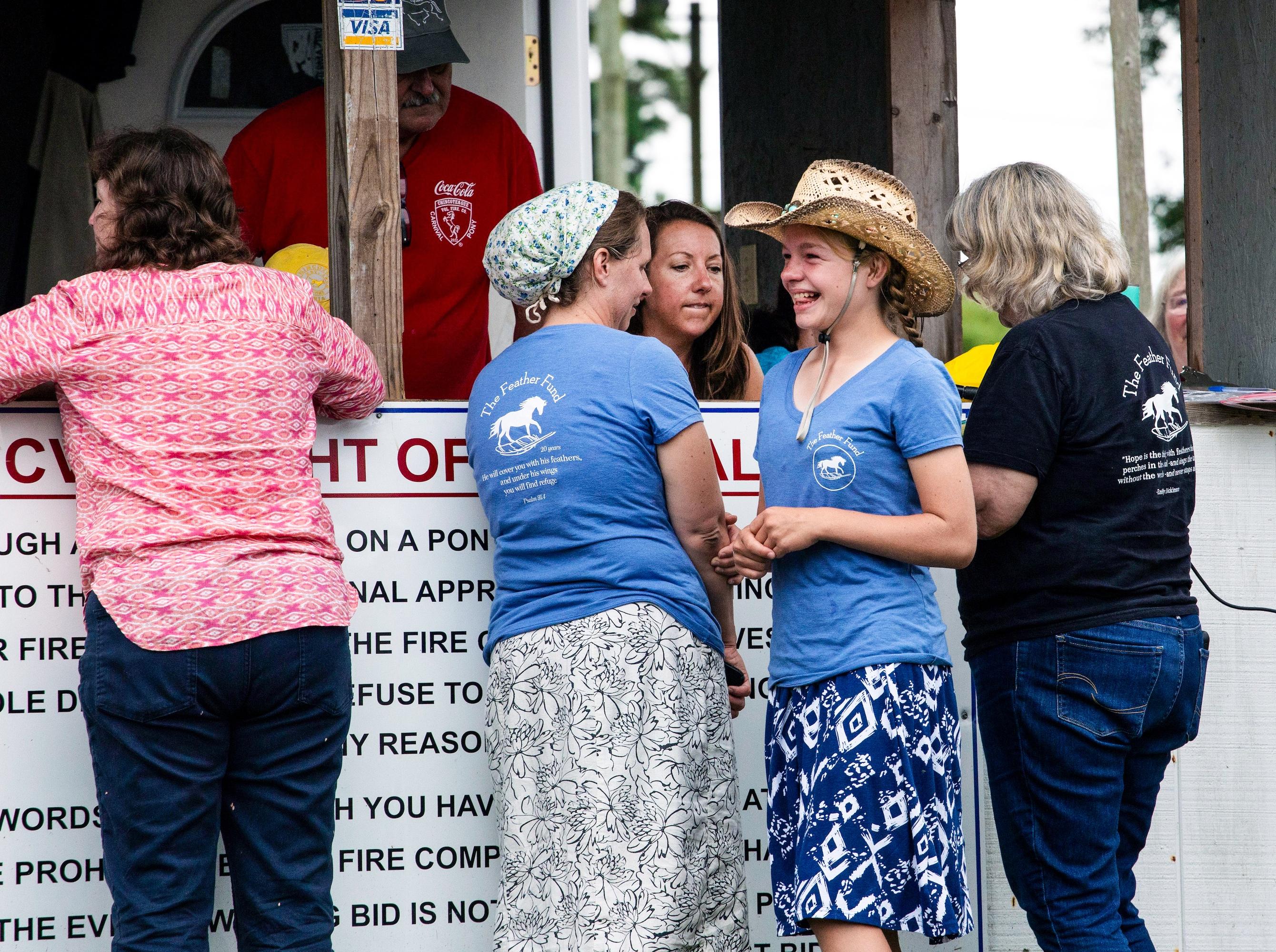
After she was diagnosed with a brain tumor, Suplee felt that God was reminding her of His presence by putting feathers in her path. During her treatment for cancer, she repeatedly found feathers in unexpected places. And each time, she felt it was a message of hope from heaven.
Grateful to have survived her surgery, she planned to purchase a buyback pony at the 1995 auction as a way to “give back,” she told friends. But she and her husband arrived after all the buybacks had been claimed.
Then someone pointed out two young sisters who were crushed that the $500 they’d saved wasn’t going to be enough to buy a pony. At the same time, a seagull drifted down in Suplee’s path.
Then she noticed one of the girls was wearing a shirt with a feather design.
Suplee made a spur-of-the-moment decision. She persuaded their parents to let her buy a pony for the girls.
“I’m meant to do this,” she said, explaining what feathers had meant to her in her cancer journey.
After the purchase, they all realized that the pony had one white marking on its brown body. The unusual splotch of white hair formed the jagged shape of a feather.
That started a tradition.
Suplee returned year after year, buying ponies to set free or to send home with children who couldn’t make that dream happen on their own.
Eight years after she gifted her first pony to a child, Suplee passed. The Feather Fund was established to continue her generous acts.
It was the chance of a Feather Fund gift that gave Aurora hope of having her own Chincoteague pony.
Aurora had learned to ride already on a special horse, Sahran.
The day after Christmas 2023, the beloved Arabian died. The family was heartbroken.
“Sahran had such a kind heart,” said Aurora’s mother, Nicole Menges. “He taught Aurora everything she knows about natural horsemanship. He was her best teacher.”
But Aurora, who is homeschooled, continued to study horses and their training. Her dream, she told Feather Fund judges in her carefully printed essay, was to train her own Chincoteague pony.
She was overjoyed to be one of two girls chosen in 2024 to receive the money needed to buy a pony.
On auction day, Aurora waved a feather in the air in honor of Suplee as she bid on a liver chestnut colt with three white socks and an upside-down teardrop on his forehead.
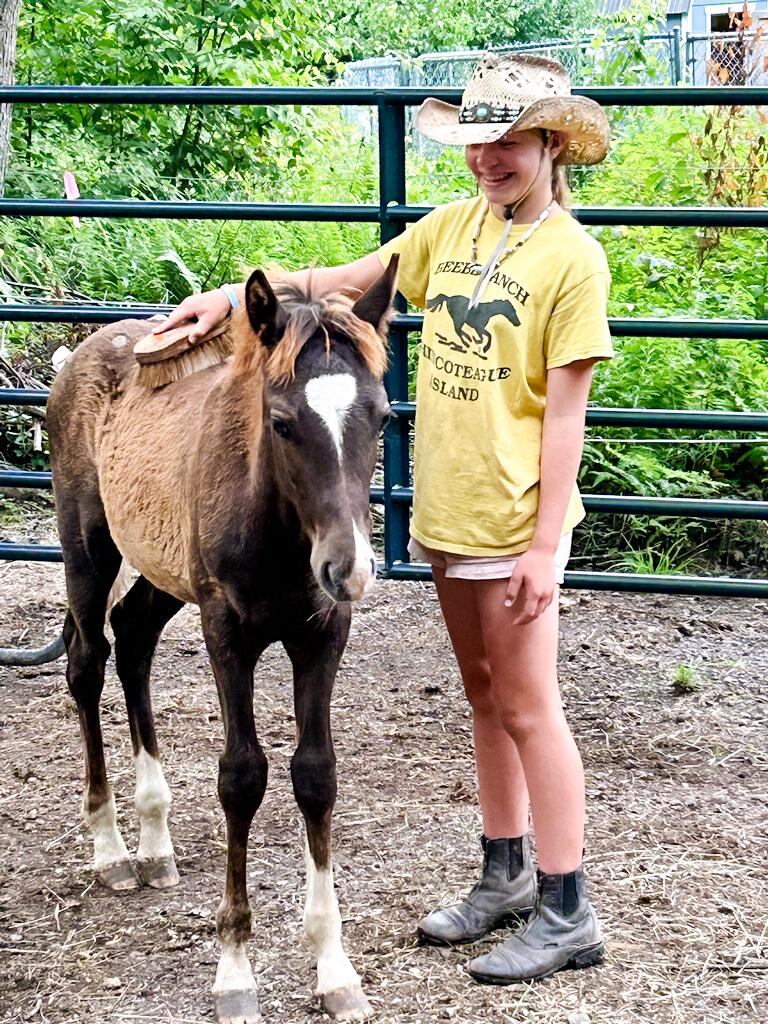
“Going once! Going twice,” the auctioneer called.
Aurora’s heart pounded.
“Sold!”
Aurora burst into happy tears. Buck, named in honor of the famous horse trainer Buck Brannaman, would be hers.
When asked what she had written that had touched Feather Fund judges enough to be chosen for such a special gift, Aurora could hardly choke out the words.
With tears streaming down her cheeks, she said, “I wrote that every pony deserves to be loved by a little girl once in its life.”
